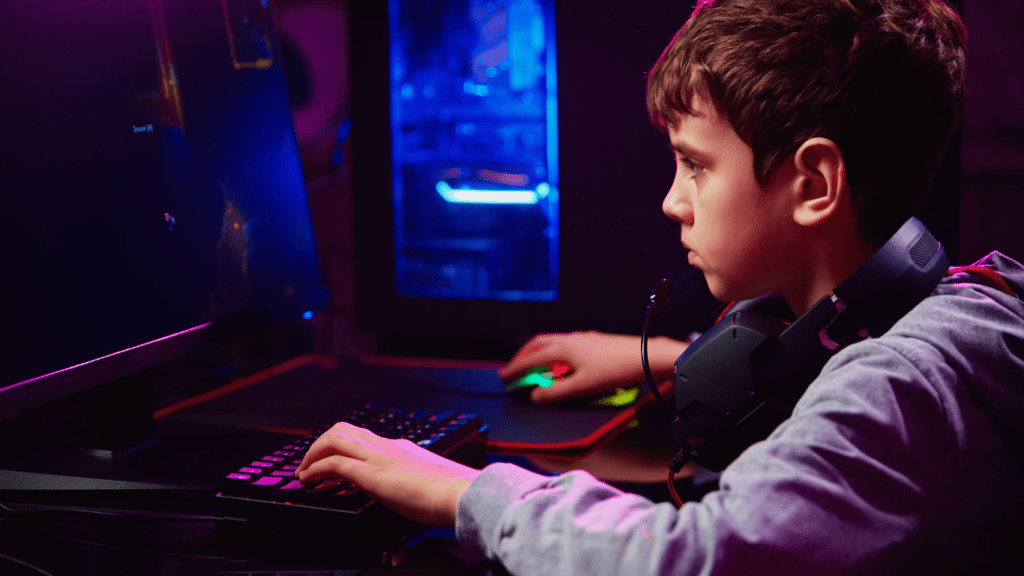The Connection Between Gaming and Language Development in Children
Video games play a significant role in language development for children. They engage young minds in meaningful ways that traditional learning methods often cannot match.
How Video Games Enhance Linguistic Abilities
Video games enhance linguistic abilities by immersing players in environments rich with diverse vocabulary and complex dialogues.
Players need to understand and respond to in-game instructions, improving their comprehension skills.
For example, role-playing games (RPGs) often feature elaborate storylines requiring players to follow intricate narratives, thereby enhancing their reading and listening abilities.
Multiplayer online games also demand communication with other players, encouraging practice in both written and spoken forms of language.
Types of Language Skills Developed Through Gaming

Different types of language skills develop through gaming.
- Vocabulary expansion occurs as players encounter new words and phrases.
- Games with historical or fantasy settings introduce archaic or specialized terms that children might not encounter elsewhere.
- Reading comprehension improves as players follow detailed storylines and instructions.
- Social games foster conversational skills, requiring players to strategize and negotiate, often in real-time.
- Games also boost critical thinking, as players need to decipher complex plots and solve in-game puzzles, enhancing their analytical language skills.
Evaluating Different Games for Language Learning in Kids
Selecting games tailored to children’s language learning needs is crucial. Different games offer varied benefits depending on age, interactivity, and educational content.
Age-Appropriate Language Learning Games
When choosing language learning games, age suitability matters.
For younger kids, animated games like “Endless Alphabet” or “Teach Your Monster to Read” offer vibrant visuals and engaging activities that introduce basic vocabulary and phonetics.
Older children benefit from more advanced options like “Duolingo Kids” or “Rosetta Stone Kids Lingo,” which provide structured language lessons and practice in multiple languages.
Interactive Features That Promote Language Skills
Interactive elements in games significantly contribute to language development. Features like voice recognition, common in games like “Speech Blubs,” allow children to practice pronunciation.
Narrative-driven games, such as “Minecraft” with its story modes, encourage reading comprehension through quest text and dialogues.
Multiplayer game modes in titles like “Animal Jam” foster language skills by motivating kids to communicate with peers, enhancing both written and spoken language abilities.
Benefits of Using Games as Language Learning Tools
Using games as language learning tools benefits children’s overall language skills development by blending education with entertainment. Games offer a dynamic platform to enhance language proficiency effectively.
Motivation and Engagement Through Interactive Play
Interactive play sparks motivation and engagement in language learning. Gamified experiences turn learning into an adventure, which captivates children’s attention.
For instance, collecting rewards in games like “Endless Alphabet” encourages young learners to master new words. The sense of achievement in unlocking new levels keeps kids eager to continue learning.
Improving Cognitive Functions Related to Language
Games that challenge cognitive functions boost language-related skills. Activities requiring problem-solving and memory strengthen mental faculties essential for language development.
For example, “Minecraft” requires planning and communication, which enhances both comprehension and expressive skills. These cognitive benefits translate to improved vocabulary and grammar understanding in everyday contexts.
Challenges and Precautions
Promoting language skills in children through gaming presents several challenges. Parents can tackle these obstacles effectively by taking specific precautions.
Monitoring Screen Time and Content
Monitoring screen time is crucial for children’s overall well-being. According to the American Academy of Pediatrics, children aged 6 and older should spend no more than two hours per day on recreational screen time.
This limitation ensures that gaming remains a beneficial tool rather than a distraction. Content monitoring is equally important.
Age-inappropriate content can negatively affect a child’s development. Parents should review game ratings and play content themselves to ensure suitability. Titles like “Endless Alphabet” and “Duolingo Kids” provide age-appropriate options.
Balancing Gaming With Other Educational Activities
- Balancing gaming with other educational activities ensures holistic development.
- Relying solely on games for language skills can neglect other critical areas.
- Integrating traditional learning methods, such as reading and writing exercises, can diversify a child’s educational experience.
- Encourage children to spend time on physical activities, social interactions, and academic studies to maintain a well-rounded routine.
- Structured schedules help kids manage time effectively, ensuring they benefit from gaming without compromising other educational opportunities.



